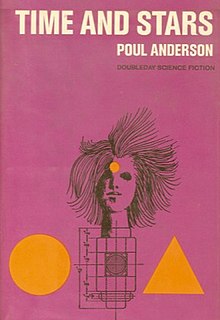Time and Stars
 Dust-jacket from the first edition | |
| Author | Poul Anderson |
|---|---|
| Cover artist | Thomas Chibbaro[1] |
| Language | English |
| Genre | Science fiction |
| Published | 1964 (Doubleday) |
| Publication place | United States |
| Media type | Print (hardback) |
| Pages | 249 |
| ASIN B0000CM9GM | |
Time and Stars is a collection of science fiction short stories by Poul Anderson, published in 1964.
"Dangerous universe: Faced with machines that think by and for themselves, super-intelligent space beings bent on a suicidal course and a galaxy teeming with dangerous alien life, man had to invent new weapons, new defenses - or perish from the universe."[2]
Contents
Source[3]
- "No Truce with Kings": A war story set on a future, semi-primitive Earth with aliens
- Original Appearance: The Magazine of Fantasy and Science Fiction, June 1963
- "The Critique of Impure Reason": A robot will not work because it is infatuated with modern literature and literary criticism
- Original Appearance: If, November 1962
- "Escape from Orbit": Astronauts stranded in orbit around the moon
- Original Appearance: Amazing Stories, October 1962
- "Eve Times Four": Space traveler Lothario is stranded on a planet with three beautiful women
- Original Appearance: Fantastic Science Fiction Stories, April 1960
- "Turning Point": A first contact story that gives a haunting portrait of the price of giftedness and the loss of innocence
- Original Appearance: If, May 1963
- "Epilogue": A crew of humans return to Earth after a long absence, finding it has been taken over by a kind of transistor-based ecology of machines; a lack of understanding between the robots and the humans leads to tragedy
- Original Appearance: Analog, March 1962
Reception
Algis Budrys in the February 1965 issue of Galaxy Science Fiction said that "what Anderson needed in Time and Stars was an editor". He disliked "Eve Times Four" and "No Truce With Kings" but liked the others, calling "Escape From Orbit" "a beautifully done piece of work like nothing I have seen in the field before".[4] In February 1966 Budrys named the book the best collection of his first year as reviewer for the magazine, and "Escape from Orbit" the best short story.[5]
References
- ^ isfdb
- ^ From the back cover of the 1975 Manor Books paperback edition
- ^ Review, Paul Camp, Amazon.com, 25 February 2010
- ^ Budrys, Algis (February 1965). "Galaxy Bookshelf". Galaxy Science Fiction. pp. 153–159.
- ^ Budrys, Algis (February 1966). "Galaxy Bookshelf". Galaxy Science Fiction. pp. 131–139.
This article includes a list of general references, but it lacks sufficient corresponding inline citations. (April 2010) |
- Tuck, Donald H. (1974). The Encyclopedia of Science Fiction and Fantasy. Chicago: Advent. p. 1.
External links
- Time and Stars title listing at the Internet Speculative Fiction Database
- Time and Stars at Open Library
